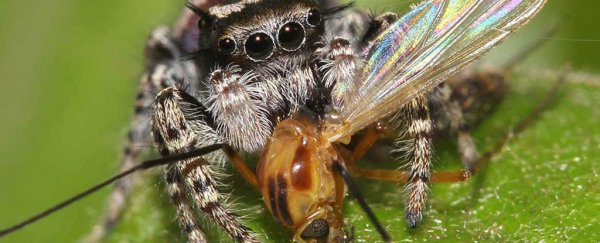If spiders already freak you out a little, here's a newly discovered scientific tidbit that probably won't help much: these insatiable predators gorge themselves on up to twice the total weight of animals that humans consume each year.
New research has found that spiders chow through as much as 800 million tonnes of prey annually – but while that upsized serving might make some of us feel uncomfortable, scientists say these arachnids are actually performing an important civic duty.
More than 90 percent of the spider diet is made up of insects and insect-like springtails, and by devouring several hundred million tonnes of these tiny pests every year, researchers say spiders play an essential role in keeping natural ecosystems in check.
"Our calculations let us quantify for the first time on a global scale that spiders are major natural enemies of insects," says one of the researchers, biologist Martin Nyffeler, from the University of Basel in Switzerland.
"In concert with other insectivorous animals such as ants and birds, they help to reduce the population densities of insects significantly. Spiders thus make an essential contribution to maintaining the ecological balance of nature."
Together with ecologist Klaus Birkhofer from Lund University in Sweden, Nyffeler analysed data from previous studies to find out how much food spiders chomp through annually.
The first order of business was to figure out just how big the global spider population is in terms of biomass.
The team sourced existing estimates based on biomass averages from a range of different terrestrial biomes – including forests, grasslands, croplands, and other areas – and concluded there's some 25 million tonnes of spiders on Earth right about now.
Just repeating that in case you passed out or anything: there's about 25 million tonnes of spiders somewhere in the world outside your house, folks (although, to be fair, some are inside it too).
Taking into account the various density of spider populations across different environments and spiders' food requirements per unit of body weight – plus prey census data from previous field studies – the researchers estimate that spiders consume somewhere between 400 and 800 million tonnes of prey each year.
The vast majority of this insect devouring occurs in forests and grasslands, which are thought to account for about 95 percent of the annual spider prey kill.
For a little context, estimates put the global human consumption of meat and fish at about 400 million tonnes annually, and even prey kill by whales is thought to be between 280 to 500 million tonnes annually – so as far as overall consumption goes, spiders are up there.
But while it's a little disquieting to think about so many spiders eating so many things year-in and year-out, it's important to remember that this is just part of the world's natural food chain – and spiders themselves are also on the menu, being preyed upon by thousands of other animals.
With the new findings, it will help future researchers to calculate how spiders eating (and being eaten) contribute to the global food chain, while also shining the spotlight on how necessary these eight-legged critters really are.
"These estimates emphasise the important role that spider predation plays in semi-natural and natural habitats, as many economically important pests and disease vectors breed in those forest and grassland biomes," says Nyffeler.
"We hope that these estimates and their significant magnitude raise public awareness and increase the level of appreciation for the important global role of spiders in terrestrial food webs."
The findings are reported in The Science of Nature.
